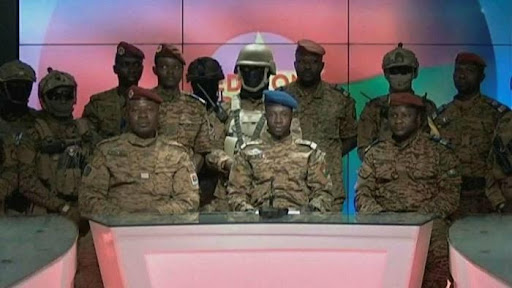After the military in Burkina Faso seized power and stripped its President Roch Kaboré, following public backlash, the local people have been celebrating in the capital city. With this Burkina Faso marked its fourth coup in the last 17 months, which was fuelled by instability across the country amidst growing Islamist intervention and violence.
But how does this coup affect the peace in the region and how serious are the growing terrorism activities? Let’s take a look-
Islamist threat- The seriousness of terrorist groups that lead to the uncontrolled displacement of power and people
What commenced as the month-long protest demanding the removal of Mr. Kabore’s, triggered the military to conduct another coup. But this seems to have a more militant facet that has affected the regions of Burkina Faso. According to the UN estimates, Burkina Faso has been witnessing militant attacks since the beginning of 2015. These unprecedented and gruesome attacks have taken the lives of almost 2000 people while leaving millions displaced.
The long-standing issues have not only created political, economic, and social instability but affected the daily lives of people in a catastrophic manner. Schools remain closed for the fear of children being attacked and public confidence in the leader’s management of security faded to the point where they started questioning their actions.
How did militant violence spread to Burkina Faso?
Despite the volatile landscape of West Africa in terms of politics and security, Burkina Faso maintained a taste of fragile stability which settled in dusk during the uprising in 2014, when the long-serving President Blaise Compaoré was ousted.
It was the first stroke that shook the nation and what followed next was just a misuse of a country’s vulnerability by the militants who exposed the borderlands to more attacks, thus expanding their presence.
Jihadists in the Burkina Faso region triggered sectarian tension by creating a clash between the Muslim and Christian communities. While Burkina Faso already did not have much humanitarian support and lacked a stable political presence, the Jihadists exposed the communities to even more vulnerability.
While political presence seemed to be undermined by the military forces of Burkina Faso, the problems rose more when in 2020, Mr. Kaboré was re-elected, considering most voters who had to flee their homes could not cast their votes. This created further unrest in the region, only to meet its end.
Experts are drawing emerging patterns in Mali, similar to the Burkina Faso coup of a military takeover. This is linked to the series of deadly attacks and mass protests in the region owing to the increasing mistrust in the government. It can only be imagined if the regions close to Burkina Faso undergo a similar fate, then militants will gain absolute power in and around the West African regions.
Is the anti-French sentiment suspected to play a role in the vulnerability of Burkina Faso?
Burkina Faso and Mali were once French colonies and it continues to share strong ties with the country, both in terms of economic structure and security needs. France has even deployed more than 5000 personnel, under the name of Operation Barkhane to stop Jihadists from marching on the capital city of Mali.
However, public backlash has blocked French convoy from delivering supplies, especially medical to the army and they have also been accused of working in conjunction with the Jihadists. This is acting as a driving force for Jihadists to gain more power as the security deteriorates in the region.
